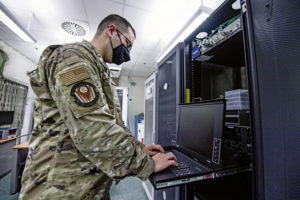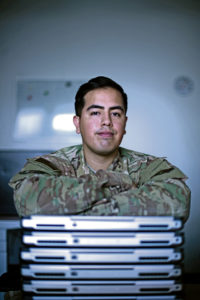No matter the job in the U.S. Air Force, there’s one resource which remains consistent between them — computers. From sending emails to gathering intelligence, every Airman relies on them.

Having access to this resource is crucial to the efficiency of air superiority, and a communications team is an essential support function for any unit. The 721st Mobility Support Squadron communications support team and cyber operations team ensure Air Mobility Command missions can be carried out by keeping this resource intact.
“Everybody needs a computer,” said Staff Sgt. Jesse McClay, 721st MSS client systems technician. “We know how to troubleshoot, fix them and get them to continue on with the mission.”
With a squadron that includes many Air Force specialties, the communications team has their work cut out for them.
“It’s a pretty broad range of people I support and what they do that pertains to the mission,” McClay said. “I’m in a pretty big supportive role, helping out everybody that’s under the wing.”
As COVID-19 rapidly spread, the wing gained a COVID-19 task force dedicated to retrieving patients throughout Europe, Africa and the Middle East. When the task force arrived at Ramstein, they required a semi-permanent work center to operate out of.
“We had to get a whole setup of different offices that needed 20 or 30 computers so people could hop on at the same time,” McClay said. “We come in with all our equipment, set it up … and make sure they can log in to the network. We’re pretty fast paced when it comes to that.”
While the communications support team works primarily on customers’ workstations, the cyber operations team provides another important role in the success of AMC missions.

“Our primary focus is on servers and systems themselves,” said Tech. Sgt. Peter Salas, 721st MSS cyber operations noncommissioned officer in charge. “Currently, what we do is manage the (Global Decision Support System) enclave here at Ramstein.”
The GDSS is a command and control software platform essential in planning and executing global AMC missions across the world. As the central hub for missions throughout European Command, Africa Command and Central Command, the 721st MSS cyber operations team must ensure the system is up and running.
“There’s a lot of really pertinent information and data off of GDSS that allows them to be able to track all their missions,” Salas said. “At any given time, any operations group that’s trying to do a flying mission utilizes this system, so it needs to be up 24-7. We’re able to keep that information available to users all around the world.”
The way they ensure the system remains online is through observation. They identify any vulnerabilities the servers may have, push updates when needed and ensure the servers remain in a cool environment so as to not overheat.
“AMC sends us software to be able to update the systems,” Salas said. “We also do daily checks; we check for vulnerabilities.”
Between the day-to-day computer troubleshooting and frequent server maintenance, the 721st MSS communications and cyber teams allow AMC to reach their goals in rapid global mobility.


